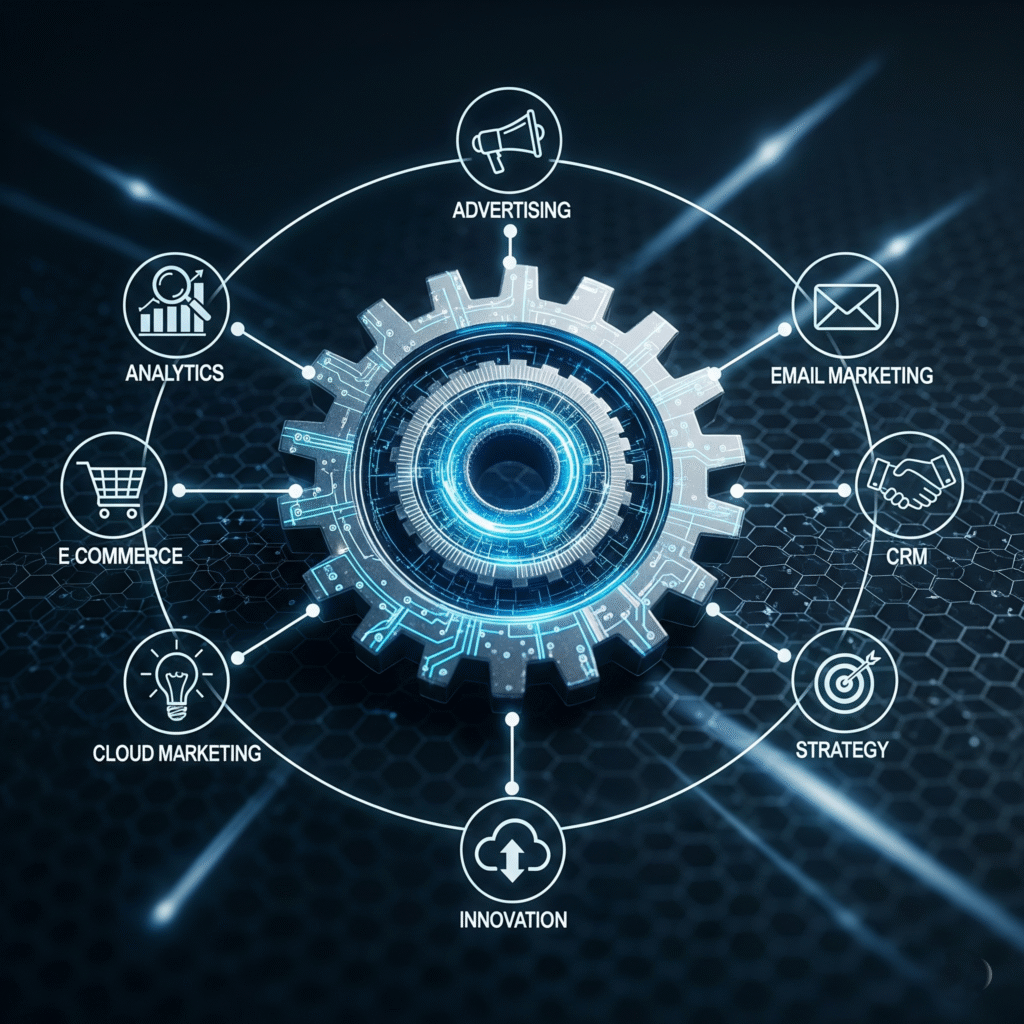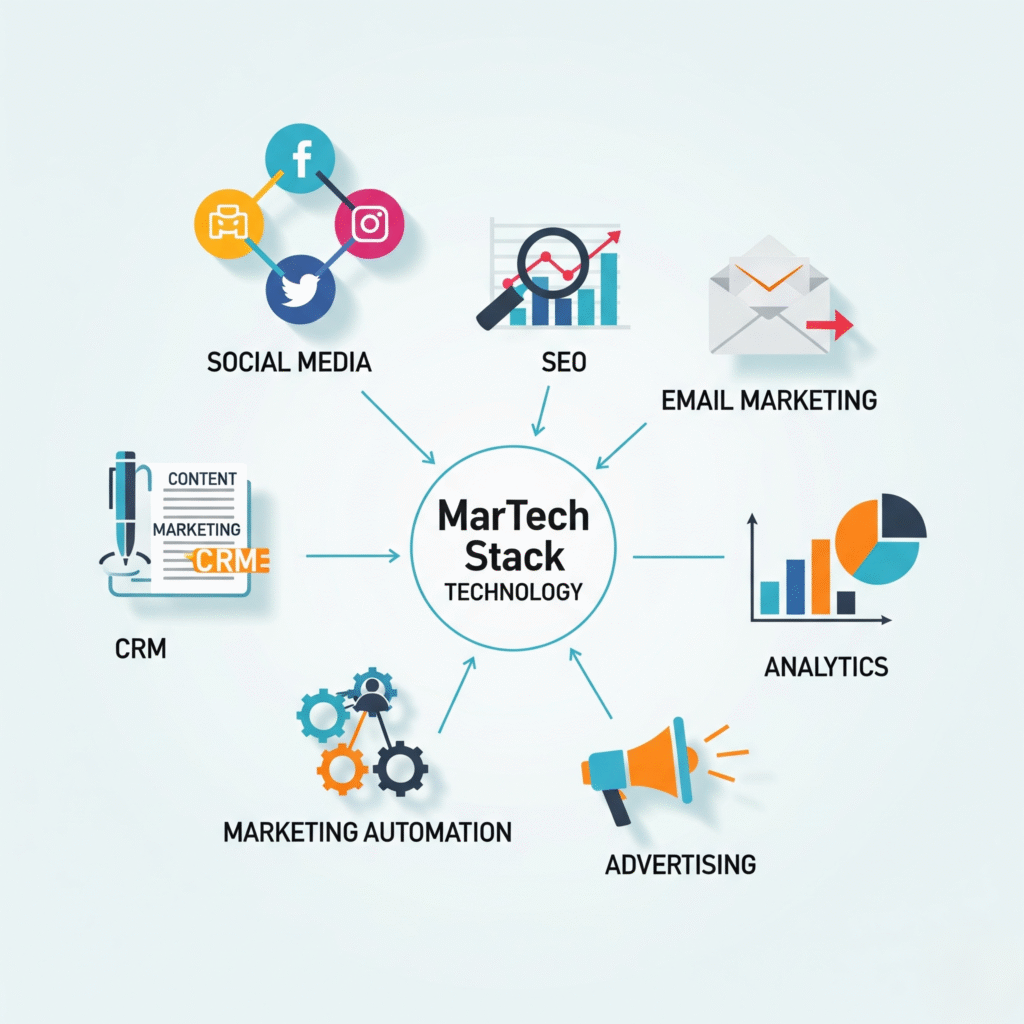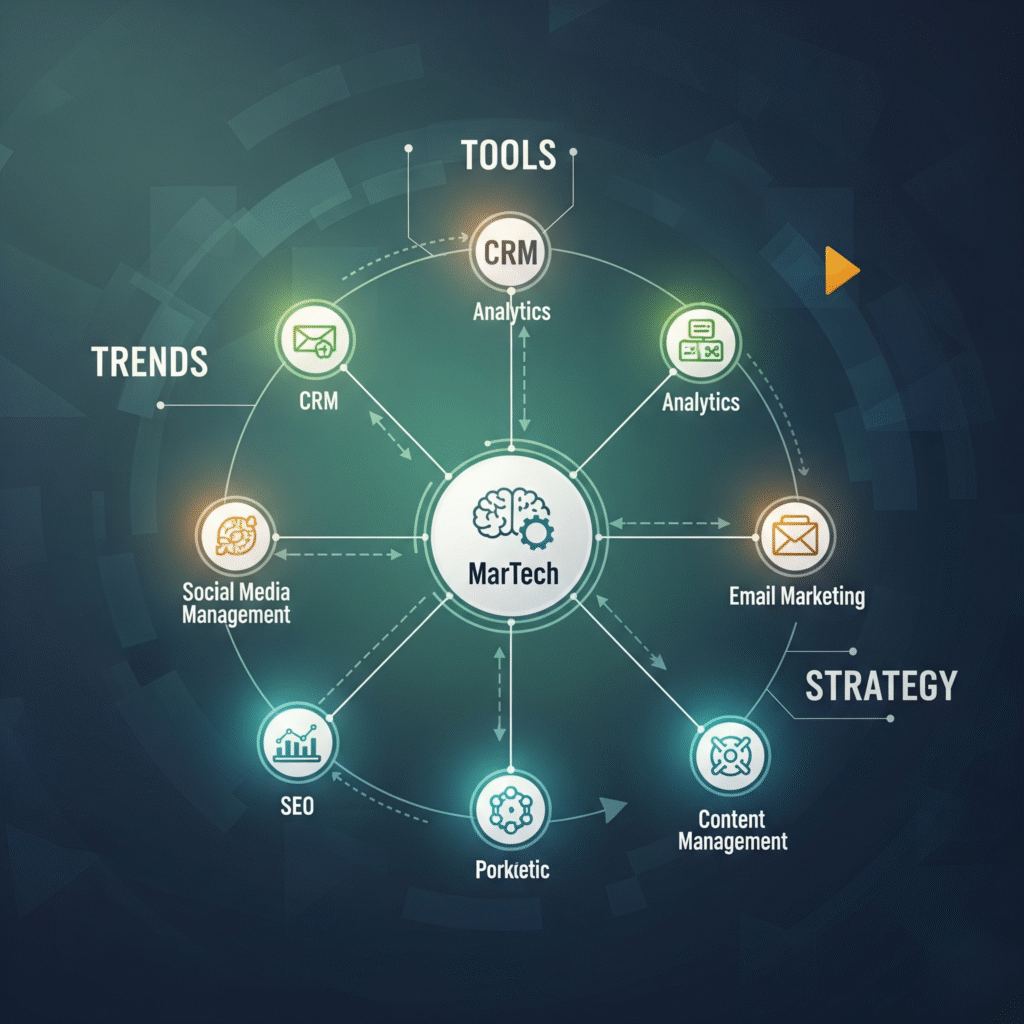Marketing Technology (MarTech): The Ultimate 2025 Guide
Introduction
The marketing industry has undergone a massive transformation in the last decade. Businesses no longer rely solely on traditional advertising such as billboards, television, or newspaper ads. Instead, they are turning to digital platforms and intelligent tools that can deliver highly targeted campaigns.
At the core of this evolution is Marketing Technology (MarTech) — the combination of marketing strategies and technological solutions designed to help companies reach, engage, and retain customers. Whether you’re running a small online store or a multinational brand, leveraging the right technology can be the key to achieving faster growth and higher returns.

What is Marketing Technology (MarTech)?
Marketing Technology (MarTech) refers to the collection of software and digital tools used by businesses to manage marketing activities, analyze performance, and improve customer experiences. This can include:
- Email marketing platforms
- Customer Relationship Management (CRM) systems
- Social media scheduling tools
- Search Engine Optimization (SEO) software
- Analytics and reporting platforms
The purpose of these tools is to make marketing more data-driven, efficient, and measurable, allowing brands to communicate with audiences in a personalized and impactful way.
Why It Matters
Adopting Marketing Technology (MarTech) is no longer optional; it’s a necessity for modern marketing. Here’s why:
- Changing Consumer Expectations – Customers expect relevant, personalized, and timely communication.
- Competitive Advantage – The right tools give you a strategic edge in crowded markets.
- Automation and Efficiency – Technology reduces repetitive work so teams can focus on creativity and strategy.
- Data-Driven Decisions – Analytics provide valuable insights into what’s working and where to improve.

Core Components of Marketing Technology
Building a successful MarTech stack involves selecting the right tools for different areas of your marketing efforts.
1. Customer Relationship Management (CRM)
CRMs like Salesforce, HubSpot, or Zoho store customer information, track interactions, and help manage leads throughout the sales funnel.
Benefits:
- Centralized customer data
- Better sales and marketing alignment
- Improved retention rates
2. Email Marketing Platforms
Email remains one of the most cost-effective marketing channels. Tools such as Mailchimp, Klaviyo, or ActiveCampaign allow you to segment audiences, automate campaigns, and personalize content.
Benefits:
- Higher engagement rates
- Automated follow-ups
- Measurable results
3. Social Media Management
Platforms like Hootsuite, Buffer, and Sprout Social help schedule content, monitor engagement, and analyze performance across multiple channels.
Benefits:
- Consistent posting
- Time efficiency
- Social listening to track brand mentions

4. SEO Tools
SEO platforms like SEMrush, Ahrefs, and Moz help identify high-value keywords, analyze competitors, and monitor rankings.
Benefits:
- Better visibility in search results
- Increased organic traffic
- Data for content strategy
5. Content Management Systems (CMS)
CMS platforms such as WordPress, Wix, and Shopify make it easy to create, edit, and manage website content.
Benefits:
- Flexible customization
- Integration with marketing tools
- User-friendly interface
6. Analytics and Reporting Tools
Google Analytics, Hotjar, and Mixpanel provide data on user behavior, website performance, and conversion rates.
Benefits:
- Data-driven decisions
- Insight into customer journeys
- Campaign optimization

Trends Shaping Marketing Technology in 2025
The Marketing Technology (MarTech) landscape continues to evolve rapidly. Here are the biggest trends shaping the future:
1. Artificial Intelligence and Machine Learning
AI is being used for predictive analytics, chatbots, content generation, and customer segmentation.
2. Customer Data Platforms (CDPs)
CDPs combine customer data from multiple sources to create unified profiles for more personalized marketing.
3. Voice and Visual Search
With smart speakers and visual recognition tools becoming mainstream, optimizing for voice and image searches is now critical.
4. Hyper-Personalization
Moving beyond basic segmentation, brands are delivering one-to-one personalized experiences using AI.
5. Privacy and Data Compliance
Regulations like GDPR and CCPA are driving businesses to adopt more transparent and ethical data practices.

How to Build a Strong MarTech Stack
Your Marketing Technology (MarTech) stack should be tailored to your goals, budget, and business size.
- Define Your Objectives – Are you focused on lead generation, customer retention, or brand awareness?
- Start with Core Tools – CRM, email platform, analytics, and CMS are essentials.
- Prioritize Integration – Choose tools that work well together to avoid data silos.
- Plan for Scalability – Select solutions that can grow as your business expands.
- Review Regularly – Evaluate performance and replace underperforming tools.
Challenges in Implementing MarTech
While Marketing Technology (MarTech) offers huge potential, it also comes with obstacles:
- Overwhelming Choices – Thousands of tools make selection difficult.
- Integration Issues – Not all platforms work seamlessly together.
- Cost Management – Premium tools can strain budgets.
- Skill Gaps – Teams may need training to use advanced features.
Measuring ROI
One of the biggest advantages of Marketing Technology (MarTech) is the ability to measure results accurately. With proper tracking, you can:
- See which campaigns generate the highest return
- Understand customer behavior patterns
- Optimize strategies based on data
For example, automated email sequences can improve lead nurturing efficiency, while AI-driven ad optimization can reduce costs and increase conversions.
The Future Outlook
The future of Marketing Technology (MarTech) lies in deeper automation, smarter personalization, and more integrated systems. As tools become more user-friendly and AI-driven, even small businesses will have access to enterprise-level marketing capabilities.
Conclusion
Marketing Technology (MarTech) has become the backbone of modern marketing strategies. By combining creative storytelling with intelligent tools, businesses can build stronger relationships with customers, operate more efficiently, and achieve better results.
As we move forward, brands that invest in the right MarTech stack — and know how to use it effectively — will stay ahead of the competition. It’s not just about keeping up with trends; it’s about shaping the future of how marketing connects with people.
Check Out Latest Post 👇
AI-Powered Chatbots for Customer Service: Transforming Customer Support in 2025


Pingback: 🏆 How to Choose the Right CRM for Your Industry in 2025 - GrowBhai